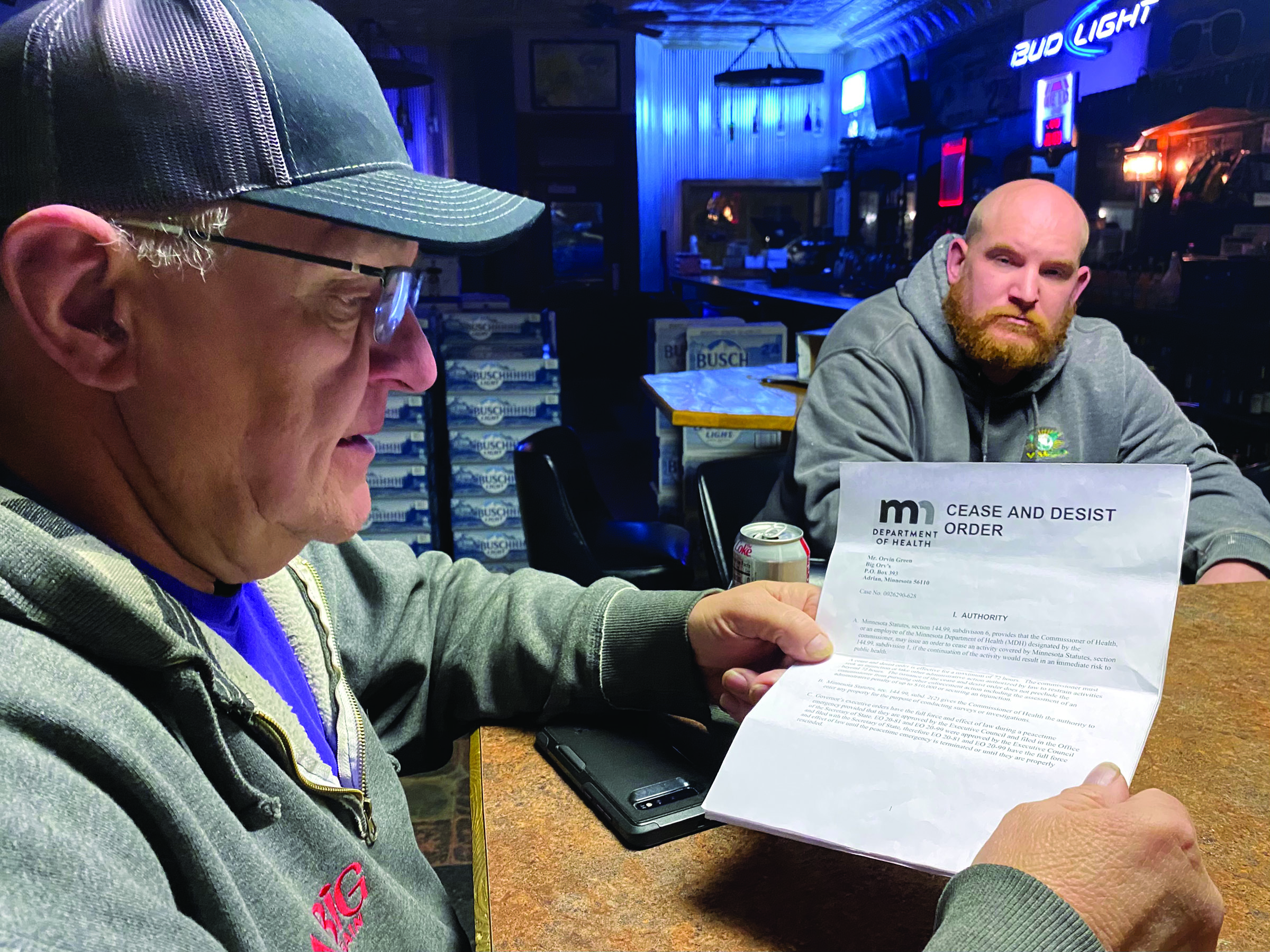 ,
, 
Big Orv’s in Adrian has been ordered to “cease and desist” operations and faces a 60-day license suspension after state officials cited the bar for on-site consumption of beverages.
Gov. Tim Walz’s latest executive order prohibits in-person drinking and dining until Jan. 10 in order to slow the spread of COVID-19.
They’re allowed to be open for off-sale liquor and food orders, but sometimes more than one customer stops in at a time.
This is what muddied the water at Big Orv’s, according to bar manager Derek Swenson.
“People would stop in for a 12-pack, and sometimes they’d ask if they could have a beer at the bar,” said Swenson, son of bar owner Orv Green, a Luverne native.
While off-sale business keeps some revenue coming in, he said it doesn’t come close to bar sales. For example, a case of beer (24 cans) sells for $19 while a can of beer sold at the bar costs $3.25.
“The real money is made at the bar,” Swenson said. “You’re paying for the atmosphere and socializing.”
Swenson said he knew that serving customers at the bar wasn’t allowed, but he also didn’t see the casual transactions as major violations.
He’d read about some bars that advertised big parties and served large crowds of maskless drinkers. He’d also heard that many other local establishments were quietly keeping their bars open to in-house patrons.
Nonetheless, a complainant called law enforcement in mid-December to report customers inside the bar at Big Orv’s.
“They called the cops three times, and the cops never came,” Green said.
Statewide, law enforcement agencies have deferred to the state MDH for enforcement of the governor’s pandemic executive orders.
By law, officers have the authority to enforce the orders, but they’ve largely played an educational role, advising violators of possible penalties.
“We never had more than 10 people at a time,” Swenson said. “And it was never past 10 p.m. That’s when we’re supposed to be closed.”
He said it wasn’t intended to be an overt defiance, but according to the state’s order, it was a violation.
Dec. 21 inspection, Dec. 28 notice delivered
According to the MDH, an unannounced state official inspected Big Orv’s on Dec. 21 and “found the establishment was open for on-site consumption of beverages, in violation of Executive Order 20-99, and a customer was observed not wearing a mask, in violation of Executive Order 20-81.”
On Dec. 28 at 10:20 a.m. a Minnesota Department of Health official delivered an order to cease and desist operations.
“She came in here, never gave me her name,” Swenson said. “She handed me the paperwork and left.”
The order provided information about a 60-day license suspension and instructed Green to call the Department of Health for information about how to proceed.
So far, he said, each time he calls, he’s prompted through a labyrinth of extensions that lead to an answering service. “I’ve left messages, but I haven’t heard back,” Green said.
Meanwhile, his patrons are wondering what happens next, and he and his son are wondering what the future holds for Big Orv’s.
Costly shutdowns, unfair border regulations
Green opened the business in 2010 and Swenson has primarily headed up operations. In January 2020, Swenson and his wife, Candace, planned to buy the bar, but they had just bought a house and decided to hold off on the business venture.
Only a few months later, the state ordered bars and restaurants closed. “On March 17 at 5 p.m. … on St. Patty’s Day, one of the biggest days of the year in Adrian,” Green said.
After bars and restaurants were allowed to reopen in June, he said it took time to rebuild business before the state shut down operations again Nov. 18.
Meanwhile, he’s paid for his $2,100 liquor license and his $750 optional 2 a.m. liquor license. “Is the state going to give me a refund?” Green said.
He added that he’s grateful for the pandemic relief aid he’s received so far through federal, state and local aid. However, those relief dollars barely pay the bills.
Before the March 2020 shutdown, Big Orv’s had done $35,000 worth of first-quarter business. The relief funds, Green said, amount to roughly 20 percent of that.
Looking into the future, he and Swenson wonder if business will ever be what it was before the pandemic.
“People are used to staying home,” Green said. “I think it will take awhile for business to come back.”
He said he respects the dangers of COVID-19, but he said it’s hard to take orders from a metro-area governor who doesn’t see how the rules affect border towns.
“You stop at Tailgator’s in Brandon, and half the people in there are from Rock County,” Green said.
“The same thing happens on the Iowa border; people in Ellsworth go to Sibley. People in Rushmore go to Little Rock.”
Executive orders based on COVID-19 cases
Gov. Tim Walz issued Executive Order 20-99 on Nov. 18 at a time of rapid acceleration in the spread of COVID-19 across Minnesota.
State officials sought to protect Minnesotans while also preventing hospitals and health care systems from becoming overwhelmed by the surge in cases.
On Jan. 8 the governor is expected to loosen restrictions in response to a downward trend in newly reported statewide cases of COVID-19.
“If he extends it again, there’s going to be a lot of people who are going to defy it,” Green said. “And I’m not so sure I’ll stay in business. … The thought has crossed my mind.”
According to MDH Assistant Commissioner Dan Huff, enforcement actions are a last resort after education and outreach fail to bring a regulated establishment into compliance.
It’s unclear, however, if health officials had made contact with Big Orv’s before last week’s citation.
“COVID-19 protocols are designed to slow the spread of this virus and reduce the impacts of this pandemic,” Huff said.
“Our preference is always to work with businesses to bring them into compliance, and we consider regulatory actions as a last resort. The vast majority of businesses are doing their best to help slow down the spread of COVID-19, and we owe it to them to have a consistent and fair enforcement approach.”


